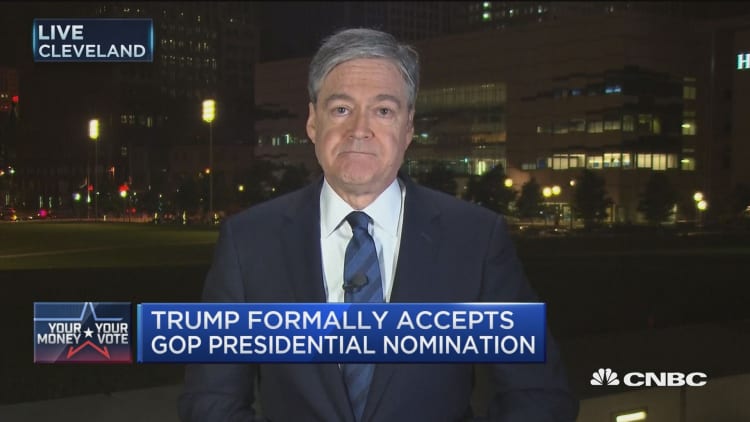


CLEVELAND — There had been hints that Donald Trump, the freshly crowned Republican presidential nominee, might start reaching out beyond his core constituency of blue-collar whites.
The investor Peter Thiel addressed the convention hall Thursday, heavy with conservative Christians, and declared himself a gay man proud to be a Republican.
Ivanka Trump, with a glittering smile and winning manner, reassured women that her father would fight for equal pay and affordable child-care.
When she finished, her proud father embraced her and took the podium. And then the message got dark.
A shouting, glowering Trump painted a hellish picture of America as a place of economic devastation and mortal fear. Conjuring the same emotions that powered his primary campaign, he portrayed illegal immigrants, not as strivers seeking a better life for their families in the United States, but as intruders taking Americans' jobs and menacing their personal safety.
He accused the Obama administration of allowing Islamist terrorism to grow unchecked under the guidance of his then-Secretary of State Hillary Clinton. He summarized the legacy of the former first lady and senator from New York succinctly: "death, destruction, terrorism and weakness."
He accused corporate elites of conspiring with her to betray American workers through international trade deals that destroyed their jobs. He rejected "globalism" in favor of "Americanism," and cast his first job as cracking down on those who threaten police officers and public safety.
"I am the law-and-order candidate," he said, adding that "without law-and-order, economic prosperity is impossible."
His nomination acceptance speech matched the tone of his primary campaign rallies. Absent were the notes of humility and need for bipartisan coalition-building that previous nominees have struck to broaden their appeal.
"I alone can fix" the nation's problems, he said in a style more typical of an autocrat than a democratically elected leader. Michael Gerson, former chief speechwriter for President George W. Bush, called it a speech arousing "primal forces" of anger and fear.
There's little reason to expect his message will attract the sorts of traditionally Republican and independent voters most resistant to him, most particularly college-education white women. There's little reason to expect it will repair his dismal ratings among the fast-growing Latino constituency, which most Republican strategists consider crucial for assembling a majority.
But Trump stuck with the raw-edged approach that won him the nomination, hoping he can expand working-class white support and turnout. His principal targets are Rust Belt states, such as Pennsylvania, Ohio and Michigan that have lately voted Democrat for president but have endured wrenching economic changes.
Will it work? Polls suggest it will be difficult.
Political strategists in both parties doubt it. But Trump has proved them wrong before.


